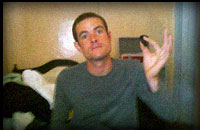
My collegeau and friend Stijn in Naivasha.
November 2010 - Email from one of the main characters
Dear Ton,
Receive much greetings from me Oscar hoping that you are pushing on with life as usual.
On my side am doing well just after arriving from our rural home. I couldn't communicate to you mainly because the home is so remote
that apart from mail box, no other services IE internet fax and any other modern infrastructure are available. That aside, I have just been employed as a
tractor driver, which I think is a big boost to my life. Tony I haven't forgotten the massive assistance that you kindly put in to my life.
God knows about everything and am sure he will bless you. So much appreciations from me here in Naivasha the land I will be very great full once again to here from you. bye 4 now
March 2009 - BEHIND the BUSINESS (from the director)
Extensive preparations went by before we went to Kenya to shoot
"a BLOOMING BUSINESS." Together with Eunice Muthoni (Kenyan Human Rights Watch) we traveled to Naivasha, one of the many areas that has grown significantly because of flower growing this past decennia.
It was obvious that for many Kenyan people the rose meant something completely different than for most Dutch people. As Jane would say later on: “The rose means for me hard work, having thorns in my hands, with a lot of chemicals.” Jane, as many other workers, also had no clue what western people use these flowers for. She thought the roses are used for toilet refreshers. When I explained that, in western countries, many lovers buy each other flowers on, for example, Valentine’s day, she reacted surprised. “In Kenya the women prefer money on Valentine’s day”.
Getting accepted into the workers’ class and earning trust of many workers was a thing on its own. People do not dare to speak up, as the white Mzungu’s stand on the other side (the employers side). We met the head of the workers union. For a long time he was a flower farm employee as well and is now a well respected person among the workers. He knows many of them and their stories personally. We planned meetings at secret places where workers could tell their stories and experiences in confidence. We had interviews in groups and one on one, during which we heard stories of more than 30 female employees from different farms. Some farms were better than others, but the stories were even worse than I could have imagined. I was shocked and got emotional: I felt more urged to make this film and promised myself I had to continue this project, no matter what. Later on in the process, whenever I felt down or was wondering why the hell on earth I was doing this (as nobody asked me to) I remembered that moment, these people and my obligation to them to finish this film.
Most issues that the people had to deal with, were not visible to the camera: corruption, sexual abuse, oppression and very bad working conditions. This was not easy, if not impossible, to film. It sure was a big challenge. Several employees told us that the companies are using many ways to avoid international rules. Women had to work while the men were spraying dangerous chemicals in the same area. Women were not allowed to wear protective gloves as they would damage the roses. As if that was not harmful enough, people had to work overtime without getting paid for it. I ran into all kinds of cunning diversions like these, fabricated by the employers. Eunice said: "Even our minister of Labour owns a flower farm, so if he improves the labourlaws, he will also be affected."
There are good aspects to the farms as well: they provide many jobs, have their own hospitals and even provide houses for the employees. But here lies a cunning diversion yet again. Eunice said (and many (former) employees confirmed) that farm hospitals are the perfect way to cover up the chemically affected people. When results from testing for chemicals turns out positive, these people get fired immediately. So in all Naivasha there are verly little reported cases of sick people due to spraying chemicals or any of that kind. The contradicting fact is that we met quite a lot of these (unknown) cases.
The farms provide many jobs, which causes an oligopoly more or less. Eunice said: “There is a high rate of unemployment in this country. The growers take advantage of this. One sacked leads to more at the gate looking for a job. Even the houses, which are provided by the employers, are part of silencing employees. Female workers who are sexually harassed, will not easily, often not at all, report their cases, because they will not only lose their jobs, but also their houses, medical care and even schooling as well."
Too much is at stake if one would want to speak up about their problems at work. Many workers felt oppressed by their managers or supervisors.
My naïve belief that the fair-trade flower would clear this all, appeared not to be completely true. From all the companies in Naivasha, only few have a fair trademark. Where do all the flowers that do not have trademarks go? Several employees confessed that there is a lot of outsourcing of very badly grown flowers to the few companies that have a trademark. That is how the farms without a trademark are still able to sell their flowers all over the globe.
It was clear we were in the middle of a dark, mysterious and hazardous situation. I felt the anxiety every day I was there (and even after I returned home I have sleepless nights). Standing face-to-face with corruption is almost inevitable; it reaches into the highest position of society all the way down to the lower class. Therefore, there were only few people that we could trust. We tried to attract as little attention as possible, but Naivasha is not a real big place nor is it visited by a lot of tourists. Two white Mzungu’s with a camera and a boom microphone in a slum area like Karagita (where many workers try to obtain a house) attract quite some attention. To avoid getting noticed as much as possible, we often had to meet our characters outside of the farming and living areas. The actual filming was prepared well, which we tried to do as unobtrusively as possible.
Three months after we left, I received news from Eunice. Apparently, we were not careful enough after all; one of Jane’s (farm worker) friends had sold her out. This was a female farm worker as well, who was even suggested as guide by the workers union. She wanted to have money from Jane, which Jane did not receive from us. As a result, Jane got fired by the company. Eunice said that according to her resign letter, she “had shared confidential company information with strangers.”
With help of my brother we send money for Jane to get independent. Now, almost one and a half year later, I still did not see that resign letter and do not know for sure she even got fired, let alone for what reason she would be fired.
Not everybody was afraid to speak up though. Many people were already fired by the blooming companies and really felt relieved that there was someone they could share their story with. We met Oscar, Kennedy and many other people who used to work at these farms. Even though these people were fired some time ago, they were still experiencing negative consequences from the farms. The water level of lake Naivasha has dropped enormously -as they say- to the mass water obstruction by the farms. A rose gets one and a half liter a day, according to the irrigating manager of the company that we filmed. (After the film was finished I was told by the farm owner he should have said per m2.)
>
Millions of roses grow in Naivasha. Fishermen also say that the breeding zones of the fish, is completely damaged because of this obstruction and also many fish die, because the chemicals that are used during spraying, in a lot of cases directly floods into the lake after it rains. Fisherman Kennedy catches less and less fish every year. When we were there he would only catch three fish a day, which he needed to share with his other two colleagues. He has a family of 5 to take care of. Oscar the water supplier also told us he experiences the damaging consequences daily. He makes a living of selling the chemically affected water to the society (mostly farm employees.) Furthermore, there are very few places where people can get access to the lake. The whole lake side is now surrounded by farms (and some hotels). For common people it is almost impossible to get access to the lake. Getting to know Oscar made also clear how complex the situation is in Naivasha (and probably a big part of Africa): he is a sincere, polite businessman, who did good on school, but unfortunately his father did not have the right connections for him to get the right job. He doesn’t have a choice than sell the polluted water to the community. Also people like our sincere taxidriver Peter, explained how frustrated he got by this and how impossible it is to achieve something in the world where corruption is dominating.
Stijn and I spent many hours discussing and writing at our hotel to figure out how to tell this so enormous complex story. In the beginning, we would talk about it in the hotel’s restaurant, but that appeared to be the main gathering place for flower farm managers and supervisors. Eventually, we spent nights writing and discussing on our balcony.
There are many more stories to tell, which I can not all tell. I started this film as an artist and with a human interest point of view. Now the film is finished I don’t know what will happen next. It is the first time I got into a situation like this, and to be honest I don’t think I want to get in something similar again. I am a filmmaker, not a journalist. I made a personal portrait about Naivasha and the people that I have met: their lives, their believes, their struggles, and their hopes and dreams. My film shows the complexity of existence of human kind in our new globalizing world.
Let this film be the voice for those that do not have a voice.
Let this film be a reason for institutions to investigate the fair trademarks.
Because if I buy fair trade flowers, I expect them to be fairly grown.
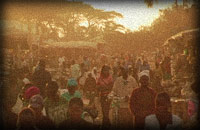
Karagita: the slum of many farm employees.

At night there was a lot of company as well.
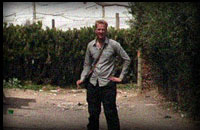
The photo camera was destroyed and this is the only video still of me in Naivasha.
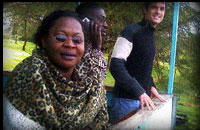
Colleagues on the spot
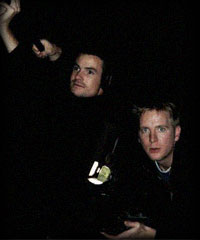
Filming at night.
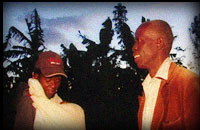
After a year Jane could visit her father.
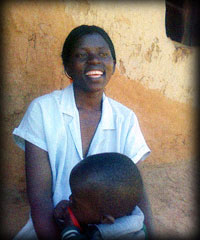
Jane at her home land during hollidays .
